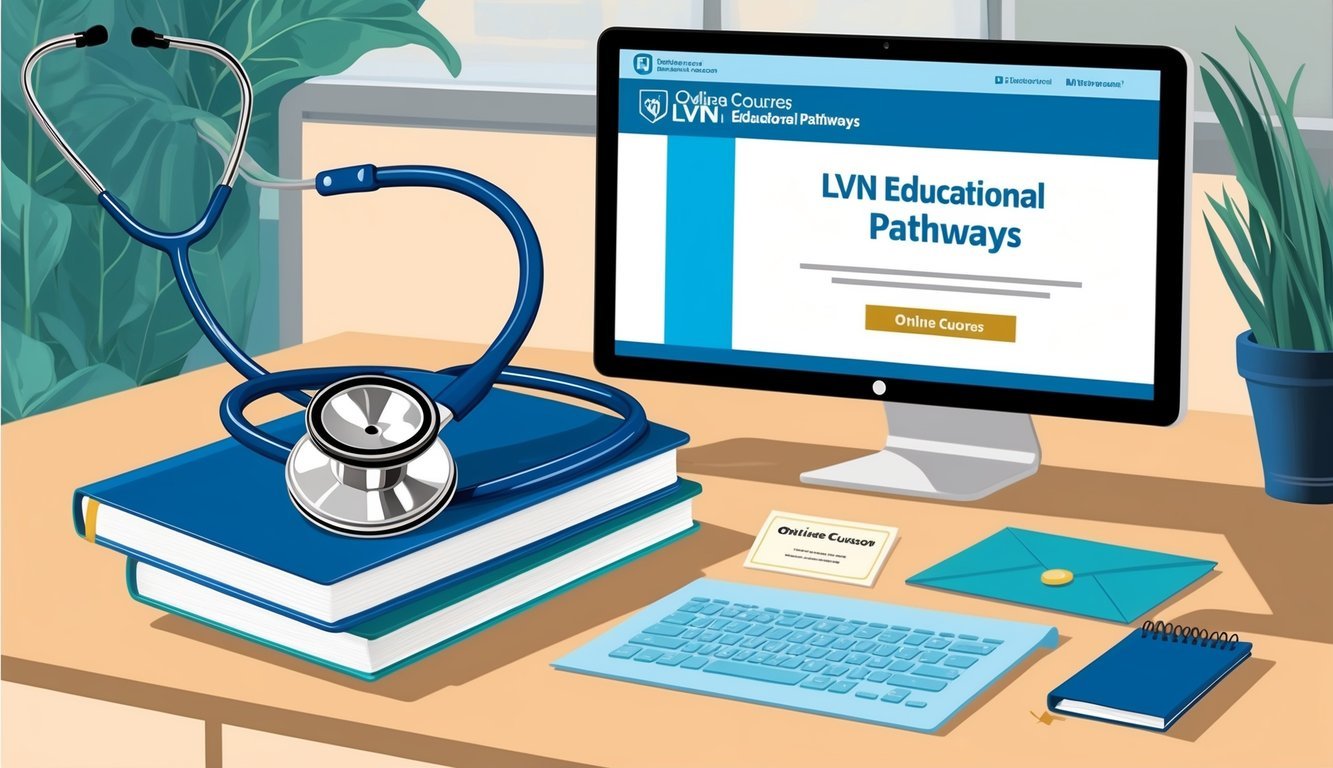As you consider a career in nursing, you may wonder about the role of a Licensed Vocational Nurse (LVN).
An LVN provides essential basic nursing care under the supervision of Registered Nurses (RNs) and physicians, serving as a vital part of the healthcare team.
This entry-level position allows you to make a meaningful impact on patient care while gaining valuable experience in various medical settings.
The responsibilities of an LVN can range from monitoring vital signs to assisting with daily living activities.
It’s a dynamic role that can lead to numerous opportunities for advancement within the nursing profession.
Understanding the Role of Licensed Vocational Nurses

Licensed Vocational Nurses (LVNs) play a vital role in patient care within various healthcare settings.
They provide essential support to registered nurses (RNs) and other medical professionals, ensuring quality care for patients.
Scope of Practice
The scope of practice for LVNs includes a range of responsibilities that focus on direct patient care.
Key duties often include:
- Monitoring Patients: Regularly checking vital signs to assess the health of patients.
- Administering Medications: Giving medications as prescribed and supervising patient responses.
- Wound Care: Assisting in the care and management of wounds, including dressing changes.
LVNs work under the supervision of RNs and physicians, which allows them to perform essential tasks that contribute significantly to patient recovery.
Their role is pivotal in addressing both physical and emotional needs of patients, ensuring a holistic approach to care.
Differences Between LVN and RN
Understanding the differences between LVNs and RNs can clarify the distinct roles they play in healthcare.
| Aspect | LVN | RN |
|---|---|---|
| Education | Typically requires a diploma or certificate from a vocational program. | Requires an associate’s or bachelor’s degree in nursing. |
| Licensure | Must pass the NCLEX-PN exam. | Must pass the NCLEX-RN exam. |
| Scope of Duties | Focuses on basic patient care tasks. | Takes on more complex medical responsibilities. |
| Patient Management | Works under RNs or doctors. | Can independently plan and manage patient care. |
LVNs are often referred to as Licensed Practical Nurses (LPNs) in many states, highlighting the equivalent nature of their roles.
The distinction primarily lies in their education and the breadth of their competencies in clinical settings.
You can learn more about the specifics of an LVN’s role and responsibilities here.
Educational Pathways for LVNs

Pursuing a career as a Licensed Vocational Nurse (LVN) involves several structured educational paths and licensure steps.
Understanding these pathways can help you navigate your journey effectively.
Vocational Nursing Programs
Vocational nursing programs are designed to prepare you for a career as an LVN.
These programs typically take 12 to 24 months to complete and are offered at high schools, community colleges, and vocational schools.
Key components of the program include:
- Clinical Experience: Hands-on training in healthcare settings.
- Core Subjects: Courses in anatomy, pharmacology, and nursing practice.
Upon completion, you will receive a diploma or certificate in vocational nursing.
Many programs also offer pathways to higher degrees, like an Associate Degree in Nursing (ADN) or a Bachelor of Science in Nursing (BSN), enhancing your nursing education and career opportunities.
Licensure Examination
After finishing your vocational nursing program, you must pass the NCLEX-PN (National Council Licensure Examination for Practical Nurses) to practice as an LVN.
This exam tests your knowledge and skills in essential nursing concepts.
Preparation for the NCLEX-PN typically involves:
- Review Courses: Many schools provide resources to help you study.
- Practice Tests: Taking practice exams can familiarize you with the format and types of questions.
Once you pass the NCLEX-PN, you will receive your state licensure, allowing you to work in various healthcare settings.
Advancement Opportunities
As an LVN, you may find several avenues for career advancement.
Pursuing continuing education is crucial for expanding your skill set and improving your employability.
Common advancement opportunities include:
- ADN or BSN Programs: Transitioning to an ADN or BSN can open doors to higher-level nursing positions.
- Specialized Certifications: Obtaining certifications in fields like IV therapy or pediatric nursing enhances your expertise.
Many healthcare employers support further education through tuition reimbursement programs, making additional qualifications more accessible.
Employment Landscape for LVNs
The employment landscape for Licensed Vocational Nurses (LVNs) is marked by a strong job outlook, a variety of work settings, and competitive salary expectations.
As the demand for healthcare services continues to grow, understanding the roles and opportunities available to LVNs is essential.
Job Outlook and Demand
The demand for LVNs is projected to rise significantly.
According to the U.S. Bureau of Labor Statistics, job opportunities for licensed practical nurses (LPNs) and LVNs are expected to grow by 9% through 2030.
This growth is driven by an aging population that requires increased medical attention and a shortage of healthcare professionals.
The ongoing nursing shortage amplifies the need for LVNs.
As healthcare facilities expand services, the role of LVNs becomes crucial in diverse settings, including hospitals and nursing homes.
Their ability to provide patient care under the supervision of registered nurses allows for a more efficient healthcare team dynamic.
Working in Different Settings
LVNs work in a variety of healthcare environments, each presenting unique opportunities and challenges.
Common workplaces include:
- Hospitals: Providing bedside care, administering medications, and monitoring patient conditions.
- Nursing Homes: Assisting elderly patients with daily activities, managing medications, and ensuring patient comfort.
- Clinics: Offering care in outpatient settings, performing routine procedures, and educating patients.
- Home Healthcare: Delivering personalized care to patients in their homes, coordinating with families and healthcare providers.
Each setting requires specific skills and adaptability, allowing you to develop a diverse set of competencies that enhance your career versatility.
Salary Expectations
The salary landscape for LVNs is competitive.
As of 2024, the average annual salary for LVNs in the U.S. is approximately $66,243.
Salaries may vary significantly based on location, experience, and workplace setting.
For example, LVNs working in urban hospitals often earn higher salaries compared to those in residential care facilities.
The table below illustrates average salaries by setting:
| Setting | Average Salary |
|---|---|
| Hospitals | $68,000 |
| Nursing Homes | $63,000 |
| Clinics | $62,000 |
| Home Healthcare | $65,000 |
This data reflects the diverse financial opportunities available to LVNs as they navigate their careers in various healthcare roles.
Professional Skills and Competencies

As a Licensed Vocational Nurse (LVN), you are equipped with specific skills and competencies essential for providing high-quality patient care.
Mastery of these skills enables you to efficiently manage healthcare responsibilities and communicate effectively with both patients and the healthcare team.
Clinical Expertise
Your clinical expertise encompasses various aspects of patient care, including monitoring vital signs, administering medications, and performing basic medical procedures.
You are trained to assess patients’ health conditions and respond to their needs.
Key responsibilities include:
- Monitoring Vital Signs: Regularly checking blood pressure, heart rate, and temperature.
- Administering Medications: Safely providing prescribed medications and ensuring patients understand their treatment plans.
- Patient Care: Assisting with daily living activities and providing emotional support.
Your proficiency in these areas not only enhances the health outcomes for your patients but also fosters a safe healthcare environment.
Communication and Interpersonal Skills
Effective communication is critical in your role as an LVN.
It’s essential for building trust and rapport with patients and collaborating with healthcare professionals.
You must convey information clearly and empathetically.
Key communication strategies include:
- Active Listening: Paying attention to patients’ concerns and responding appropriately.
- Patient Education: Clearly explaining treatment options and health care instructions.
- Team Collaboration: Sharing important patient information with colleagues to ensure comprehensive care.
Strengthening these skills can lead to improved patient satisfaction and better health outcomes.
Organizational Abilities
Strong organizational skills are vital in managing a busy healthcare setting.
You are often required to prioritize tasks and manage time effectively to ensure that all patients receive timely and appropriate care.
Essential organizational strategies include:
- Time Management: Allocating specific times for patient assessments, care, and documentation.
- Documentation Skills: Accurately recording patient information in medical records to maintain continuity of care.
- Task Prioritization: Identifying urgent patient needs and addressing them promptly.
These skills not only contribute to efficient workflow but also enhance patient safety and care delivery.
For more on developing organizational skills, you can refer to resources such as NCC.
Continuing Education and Career Growth
Continuing education is crucial in the nursing field for enhancing your skills and advancing your career.
By pursuing further education, you can increase your opportunities within nursing and transition to more advanced roles.
Furthering Education in Nursing
Engaging in continuing education allows you to stay updated with the latest practices and technologies in nursing.
This is essential, as healthcare is constantly evolving.
You can take courses through accredited programs that provide Continuing Education Units (CEUs).
For Licensed Vocational Nurses (LVNs), this could involve pursuing a Bachelor of Science in Nursing (BSN) or an Associate Degree in Nursing (ADN).
Both pathways facilitate increased job prospects and higher earning potential.
Here’s a brief overview of common nursing education options:
| Degree/Program | Duration | Outcome |
|---|---|---|
| Certificate | 6-12 months | Entry-level nursing positions |
| ADN | 2 years | Associate-level nursing roles |
| BSN | 4 years | Expanded opportunities in nursing |
| RN-to-BSN Programs | Varies (often 1-2 years) | Transition to registered nurse |
Consider utilizing platforms like Elite Learning to explore CEU courses tailored to your needs.
Transitioning to RN or NP
Transitioning from LVN to Registered Nurse (RN) or Nurse Practitioner (NP) positions can significantly enhance your career.
Both routes offer the potential for greater responsibility, autonomy, and income.
To transition, you can enroll in a bridge program designed specifically for LVNs.
These programs typically focus on advanced nursing concepts and clinical practices to prepare you for RN licensure.
Nurse Practitioner programs often require a BSN as a prerequisite.
Completing an NP program qualifies you to diagnose conditions and prescribe medications, expanding your scope of practice substantially.
It’s important to understand the additional requirements for these roles.
For RNs, you need to pass the NCLEX-RN exam after completing an ADN or BSN program.
Meanwhile, NPs need a Master of Science in Nursing (MSN) or Doctor of Nursing Practice (DNP) and certification.
For detailed information on transitioning options, consult resources like Nurse Journal.

